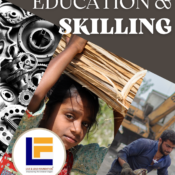
Skills-based empowerment for low-income communities
The value of continuously improving one’s skill set is crucial in the ever-changing modern global economy. But there’s a big problem in developing nations: certain groups are socially deprived. A lack of educational and occupational options traps these disadvantaged people in a vicious circle of poverty. This blog delves into the urgent requirement for programs that teach new skills to people in emerging nations who are economically and socially disadvantaged.
Reducing Inequality in Employment Opportunities:
Communities living in social deprivation in developing nations frequently face the double whammy of low wages and restricted educational opportunities, making it difficult for them to escape the cycle of poverty. By equipping people with marketable skills, upskilling programs can help them escape this vicious cycle and rise in the economic and social stratosphere.
In many developing nations, economic inequality is closely associated with social deprivation. To assist close this gap, upskilling programs provide disadvantaged people the tools they need to enter the formal market. Live and Lead foundation can help narrow the income gap by providing more chances for people in these places to work.
In addition to teaching useful skills, upskilling programs also help people become more integrated into their communities. People from low-income areas can strengthen their communities’ economic and social fiber by learning new skills. As a result of these connections, people feel less alone and more a part of the community.
A smart investment in human capital would be to fund programs that help people in economically and socially disadvantaged areas acquire new skills. By providing people with the right skills, nations may tap into the latent potential of a large chunk of their population. As a whole, the country benefits, and the people involved reap personal rewards as well.
The need for a wide range of expertise in fields like renewable energy, healthcare, and technology is growing as a result of the fast transformation taking place in the world’s economies. People in low-income areas run the danger of falling behind if they can’t afford to get an education or a job. So that they may take part in and make a positive impact on the changing economy, these communities can benefit from upskilling programs designed specifically for them.
Minorities and women are disproportionately represented in economically and socially disadvantaged communities. In order to promote diversity and inclusion in the workforce, society should prioritize upskilling programs that target these groups specifically. This will help them overcome gender and racial hurdles.
Innovation and entrepreneurship are encouraged through upskilling, which goes beyond only equipping people for current job openings. Countries may boost local economies and promote sustainable development by empowering economically disadvantaged groups to find and create their own opportunities.
Last but not least, enhancing the employability of underprivileged populations in underdeveloped nations is crucial for long-term, equitable growth, and not merely a question of social justice. Nations can fully utilize their human capital, decrease inequality, and create a more resilient and prosperous future for everyone by investing in education and skills training that is appropriate to the needs of these communities.
Recent Posts
Environment sustainability and NGO’s
Skills-based empowerment for low-income communities
The societal worth of women from low-income community
+91 9312189789
+91 9654807520
info@liveandlead.in



